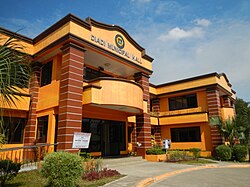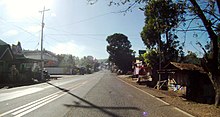Diadi
Diadi | |
|---|---|
| Municipality of Diadi | |
 Municipal hall | |
 Map of Nueva Vizcaya with Diadi highlighted | |
Location within the Philippines | |
| Coordinates: 16°39′36″N 121°22′07″E / 16.66°N 121.3686°E | |
| Country | Philippines |
| Region | Cagayan Valley |
| Province | Nueva Vizcaya |
| District | Lone district |
| Founded | June 17, 1967 |
| Barangays | 19 (see Barangays) |
| Government | |
| • Type | Sangguniang Bayan |
| • Mayor | Sandy M. Gayaton |
| • Vice Mayor | Rolito Dulnuan |
| • Representative | Luisa L. Cuaresma |
| • Electorate | 11,517 voters (2022) |
| Area | |
• Total | 181.20 km2 (69.96 sq mi) |
| Elevation | 320 m (1,050 ft) |
| Highest elevation | 803 m (2,635 ft) |
| Lowest elevation | 169 m (554 ft) |
| Population (2020 census)[3] | |
• Total | 19,236 |
| • Density | 110/km2 (270/sq mi) |
| • Households | 4,911 |
| Economy | |
| • Income class | 4th municipal income class |
| • Poverty incidence | 12.97 |
| • Revenue | ₱ 120 million (2020) |
| • Assets | ₱ 133.2 million (2020) |
| • Expenditure | ₱ 93.5 million (2020) |
| • Liabilities | ₱ 40.22 million (2020) |
| Service provider | |
| • Electricity | Nueva Vizcaya Electric Cooperative (NUVELCO) |
| Time zone | UTC+8 (PST) |
| ZIP code | 3712 |
| PSGC | |
| IDD : area code | +63 (0)78 |
| Native languages | Gaddang Ilocano Bugkalot Tagalog |
| Website | www |
Diadi, officially the Municipality of Diadi (Gaddang: Ili na Diadi; Ilocano: Ili ti Diadi; Tagalog: Bayan ng Diadi), is a municipality in the province of Nueva Vizcaya, Philippines. According to the 2020 census, it has a population of 19,236 people.[3]
Diadi is 39 kilometres (24 mi) from Bayombong and 304 kilometres (189 mi) from Manila.
History
Diadi was formerly a barangay of Bagabag named Picat. It was originally founded by the Spaniardsin the 18th century at the summit of Mount Namamparang, before being moved into the bottom of the same mountain. The settlement served as a garrison and rest stop along the mountain road between Isabela and Nueva Vizcaya, which was frequently plagued by pagan headhunters, and a resettlement site for christianized Ifugaos and Ilongots.[5]
House Bill No. 182, titled "An Act Creating the Municipal District of Diadi in the Province of Nueva Vizcaya," was introduced by Congressman Leonardo B. Perez on February 28, 1966. It was subsequently approved by the Committee on Provincial and Municipal Governments in Committee Report No. 54. Later, in May 1967, Senator John Osmeña issued Committee Report 1053 recommending passage of the Bill. On 17 June 1967, R.A. 4973 was approved by both chambers of Congress, thus creating the Municipality of Diadi.[6]
Geography
Barangays
Diadi is politically subdivided into 19 barangays. Each barangay consists of puroks and some have sitios.
- Ampakleng
- Arwas
- Balete
- Bugnay
- Butao
- Decabacan
- Duruarog
- Escoting
- Langka
- Lurad
- Nagsabaran
- Namamparan
- Pinya
- Poblacion
- Rosario
- San Luis
- San Pablo
- Villa Aurora
- Villa Florentino
Climate
| Climate data for Diadi, Nueva Vizcaya | |||||||||||||
|---|---|---|---|---|---|---|---|---|---|---|---|---|---|
| Month | Jan | Feb | Mar | Apr | May | Jun | Jul | Aug | Sep | Oct | Nov | Dec | Year |
| Mean daily maximum °C (°F) | 24 (75) |
25 (77) |
28 (82) |
31 (88) |
31 (88) |
30 (86) |
29 (84) |
29 (84) |
29 (84) |
28 (82) |
26 (79) |
24 (75) |
28 (82) |
| Mean daily minimum °C (°F) | 18 (64) |
19 (66) |
20 (68) |
22 (72) |
23 (73) |
23 (73) |
23 (73) |
23 (73) |
23 (73) |
22 (72) |
21 (70) |
20 (68) |
21 (70) |
| Average precipitation mm (inches) | 119 (4.7) |
83 (3.3) |
54 (2.1) |
37 (1.5) |
133 (5.2) |
132 (5.2) |
161 (6.3) |
163 (6.4) |
153 (6.0) |
142 (5.6) |
160 (6.3) |
224 (8.8) |
1,561 (61.4) |
| Average rainy days | 18.4 | 13.6 | 11.6 | 9.4 | 19.3 | 21.9 | 23.9 | 23.4 | 21.1 | 16.3 | 18.1 | 21.4 | 218.4 |
| Source: Meteoblue[7] | |||||||||||||
Demographics
| Year | Pop. | ±% p.a. |
|---|---|---|
| 1970 | 4,407 | — |
| 1975 | 6,649 | +8.60% |
| 1980 | 8,605 | +5.29% |
| 1990 | 11,351 | +2.81% |
| 1995 | 12,469 | +1.78% |
| 2000 | 14,374 | +3.09% |
| 2007 | 15,567 | +1.11% |
| 2010 | 16,484 | +2.10% |
| 2015 | 18,122 | +1.82% |
| 2020 | 19,236 | +1.18% |
| Source: Philippine Statistics Authority[8][9][10][11] | ||
Economy
Poverty incidence of Diadi
5 10 15 20 2006 18.80 2009 17.55 2012 16.52 2015 15.00 2018 14.33 2021 12.97 Source: Philippine Statistics Authority[12][13][14][15][16][17][18][19] |
Tilapia industry
On January 11, 2008, the Cagayan Bureau of Fisheries and Aquatic Resources (BFAR) stated that tilapia production grew and Cagayan Valley is now the Philippines’ tilapia capital. Production supply grew 37.25% since 2003, with 14,000 metric tons (MT) in 2007. The recent aquaculture congress found that the growth of tilapia production was due to government interventions: provision of fast-growing species, accreditation of private hatcheries to ensure supply of quality fingerlings, establishment of demonstration farms, providing free fingerlings to newly constructed fishponds, and the dissemination of tilapia to Nueva Vizcaya (in Diadi town). Former cycling champion Lupo Alava is a multi-awarded tilapia raiser in Bagabag, Nueva Vizcaya. Chairman Thompson Lantion of the Land Transportation Franchising and Regulatory Board, a retired two-star police general, has fishponds in La Torre, Bayombong, Nueva Vizcaya. Also, Nueva Vizcaya Gov. Luisa Lloren Cuaresma also entered into similar aquaculture endeavors in addition to tilapia production.[20]
Government
Local government

Diadi, belonging to the lone congressional district of the province of Nueva Vizcaya, is governed by a mayor designated as its local chief executive and by a municipal council as its legislative body in accordance with the Local Government Code. The mayor, vice mayor, and the councilors are elected directly by the people through an election which is being held every three years.
Elected officials
| Position | Name |
|---|---|
| Governor | Jose V. Gambito |
| Mayor | Sandy M. Gayaton |
| Vice-Mayor | Rolito Dulnuan |
| Councilors | Romelyn Madume |
| Waren Lunag | |
| Rhodora F. Bilog | |
| Elena G. Llantada | |
| Alanvin D. Tacadena | |
| Rommel F. Cariño | |
| Marvic S. Padilla | |
| Wilma Concillo |
Tourism
Lower Magat Eco-Tourism Park is located in Municipality of Diadi along the Magat River, a 1,200 hectares (3,000 acres) eco-park acquired by the provincial government for preservation later turned into a nature park. The parks includes lagoons, camping grounds, swimming pools, cottages, and recreational activity facilities for hiking and biking.[22]
Education
The Schools Division of Nueva Vizcaya governs the town's public education system. The division office is a field office of the DepEd in Cagayan Valley region.[23] The office governs the public and private elementary and public and private high schools throughout the municipality.
References
- ^ Municipality of Diadi | (DILG)
- ^ "2015 Census of Population, Report No. 3 – Population, Land Area, and Population Density" (PDF). Philippine Statistics Authority. Quezon City, Philippines. August 2016. ISSN 0117-1453. Archived (PDF) from the original on May 25, 2021. Retrieved July 16, 2021.
- ^ a b Census of Population (2020). "Region II (Cagayan Valley)". Total Population by Province, City, Municipality and Barangay. Philippine Statistics Authority. Retrieved 8 July 2021.
- ^ "PSA Releases the 2021 City and Municipal Level Poverty Estimates". Philippine Statistics Authority. 2 April 2024. Retrieved 28 April 2024.
- ^ Salgado, Pedro. "Various Towns of Nueva Vizcaya". Cagayan Valley and Easter Cordillera: 1581-1898, Volume II. Rex Publishing. pp. 884–887.
- ^ "An Act Creating the Municipal District of Diadi in the Province of Nueva Vizcaya". LawPhil.net. Retrieved 2021-01-12.
- ^ "Diadi: Average Temperatures and Rainfall". Meteoblue. Retrieved 4 July 2021.
- ^ Census of Population (2015). "Region II (Cagayan Valley)". Total Population by Province, City, Municipality and Barangay. Philippine Statistics Authority. Retrieved 20 June 2016.
- ^ Census of Population and Housing (2010). "Region II (Cagayan Valley)" (PDF). Total Population by Province, City, Municipality and Barangay. National Statistics Office. Retrieved 29 June 2016.
- ^ Censuses of Population (1903–2007). "Region II (Cagayan Valley)". Table 1. Population Enumerated in Various Censuses by Province/Highly Urbanized City: 1903 to 2007. National Statistics Office.
- ^ "Province of Nueva Vizcaya". Municipality Population Data. Local Water Utilities Administration Research Division. Retrieved 17 December 2016.
- ^ "Poverty incidence (PI):". Philippine Statistics Authority. Retrieved December 28, 2020.
- ^ "Estimation of Local Poverty in the Philippines" (PDF). Philippine Statistics Authority. 29 November 2005.
- ^ "2003 City and Municipal Level Poverty Estimates" (PDF). Philippine Statistics Authority. 23 March 2009.
- ^ "City and Municipal Level Poverty Estimates; 2006 and 2009" (PDF). Philippine Statistics Authority. 3 August 2012.
- ^ "2012 Municipal and City Level Poverty Estimates" (PDF). Philippine Statistics Authority. 31 May 2016.
- ^ "Municipal and City Level Small Area Poverty Estimates; 2009, 2012 and 2015". Philippine Statistics Authority. 10 July 2019.
- ^ "PSA Releases the 2018 Municipal and City Level Poverty Estimates". Philippine Statistics Authority. 15 December 2021. Retrieved 22 January 2022.
- ^ "PSA Releases the 2021 City and Municipal Level Poverty Estimates". Philippine Statistics Authority. 2 April 2024. Retrieved 28 April 2024.
- ^ Abs-Cbn Interactive, Cagayan Valley country’s tilapia capital
- ^ "Diadi - Nueva Vizcaya - Election Result". GMA News. 13 May 2022. Retrieved 10 April 2024.
- ^ "A Nature Gataway Awaits at Lower Magat Eco-Tourism Park". 7641 Islands of the Philippines. Retrieved 10 April 2024.
- ^ "DEPED REGIONAL OFFICE NO. 02". DepED RO2 | The official website of DepED Regional Office No. 02.
External links
![]() Media related to Diadi at Wikimedia Commons
Media related to Diadi at Wikimedia Commons




